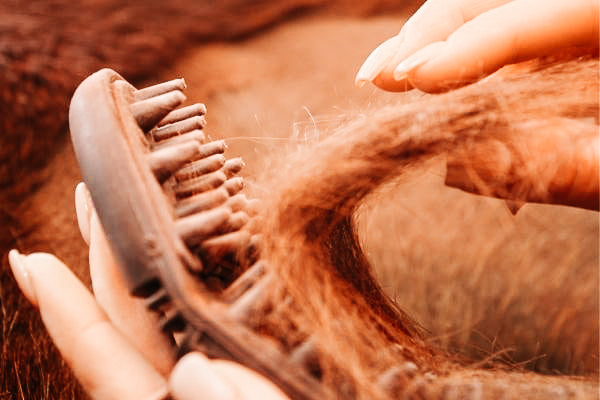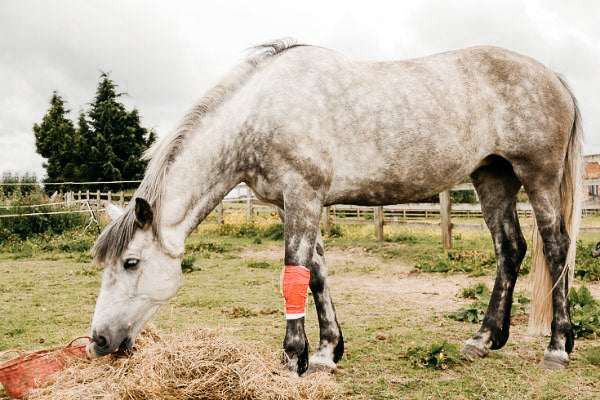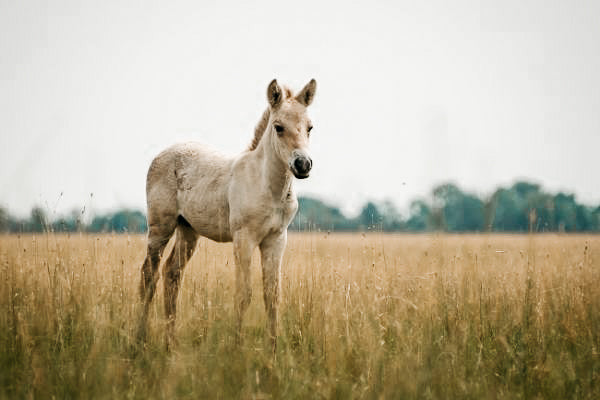
Horse coat change
Sub-zero temperatures in winter, bikini weather in summer: the seasons determine whether we dress airy or combine several layers in an onion look. Our partner horse is also prepared for the change of seasons and changes his hair twice a year. This is tiring, for you, as you have to free your horse from a huge pile of hair, but above all for your horse, because the entire immune system has to work together to switch from summer to winter wardrobe and vice versa. It is important that you support your horse and ensure that it survives the coat change well and healthy.

But how does a horse even notice that it is time to take off the old horse skin and put on new one?
Your horse's coat change is influenced by how long the days are. If it starts to get lighter again after a dark winter, which is already the case at the end of December, your horse gets the signal that it needs to prepare for a change in the seasons. That's why some horses start shedding their long winter fur as early as mid-January. The same thing happens when the days get shorter again in late summer. Here the shorter fur is exchanged for longer.
The temperature has a minor influence on the timing of the change. However, this influences the length and density of the horse's fur. How long the coat becomes depends on whether you cover your horse and whether it is in a stable or an open stable. Furthermore, different horse breeds develop different densities of fur; an Icelandic horse, for example, produces more hair mass than an Arabian.
The horse's largest organ is the skin. It protects the body from external influences, transmits stimuli and is also responsible for heat regulation and immune defense. It is therefore very important for the organism that the skin and hair coat are intact. The horse's organism suffers particularly during the coat change. Your horse may seem a little more tired and weaker than usual during this time. This is not a problem and totally normal, because your four-legged friend's metabolism has a lot to do. If you notice that your horse is not quite as energetic as usual, you should support your horse's metabolism, intestines and entire organism so that the horse's coat can renew itself healthily.
Older horses in particular often have problems when changing their coats. Then you should take the horse care particularly carefully. Of course, you should approach the training a little more calmly so that your horse cooperates happily and happily despite the coat change and is not overloaded.

But how can you support the horse's coat change?
On the one hand, it is important to give your horse the right coat care, and on the other hand, you can help the organism from the inside with herbs for horses. During the period of coat change, your horse will particularly enjoy it if you pamper it with the right horse brushes. Because now it itches and scratches everywhere.
What should the horse grooming box contain?
Which horse brushes are important and useful for horse care?
Your horse grooming equipment range should definitely contain a rubber manure bar with which you can brush your horse's fur in circular movements. The rubber curry comb stimulates the skin and your horse will thank you with a satisfied grooming face. A root brush is still part of the horse's grooming equipment and supports horse care. You use this by brushing the direction of the horse's fur with the curry comb. A soft brush brush is used on the sensitive parts of your horse's body such as the head and legs. There are also various horse brushes that have been specially developed for changing coats and help to brush loose undercoat hair from the coat. These usually have close-meshed nubs or spikes so that they can catch deeper fur.
Our Animalon massage stick is the absolute “secret weapon” against loose hair and helps us and our pets change their fur quickly and easily contested.The positive side effect - your horse is not only helped to lose the excess fur, but also enjoys a soothing massage at the same time. So you can see that the Animalon massage curry comb should definitely not be missing from your horse grooming box.
Furthermore, nutrients and herbs can support the horse's coat change. It is important that you cover your horse's increased nutritional needs during the coat change and thus strengthen the organism. There are some helpful home remedies and herbs for horses.
Just which additives and herbs make sense?
To ensure that coat change is not delayed by a lack of omega-3 fatty acids, your horse should definitely be given oil in the form of linseed, sunflower or hemp oil. You can simply add a little oil to the feed and your horse will absorb it from the diet without any further effort. In order for the omega-3 fatty acid to be converted into the active form, docosahexaenoic acid, your horse needs zinc. Zinc is also involved in cell division and the growth of hair and hair roots. Many horses today suffer from acute zinc deficiency because the hay no longer contains enough of it. So it makes sense to feed zinc during shedding. Your veterinarian will be happy to advise you and recommend the right preparation.

Herbs for horses help to support the horse's coat change. The liver and kidneys need help in removing stressful breakdown products, as does your horse's immune system so that your horse gets through the change well. Stinging nettle, fenugreek seeds, dandelion, milk thistle, gluten, hawthorn and horsetail are particularly suitable for this. You have a wide range of supporting products that combine these herbs in the right quantities. Of course, it is also possible to mix your own herbal cocktail for your horse. Unfortunately, this is much more complicated than simply buying a finished product.
Also keep in mind that your horse usually gets less exercise in winter and excess fat can put undue strain on your horse's metabolism. Fat deposits and increased uric acid levels in the blood can occur. Herbs that promote regeneration and diuretics, such as fennel or sticky herb, can now support the kidneys and liver and thus detoxify them.
Observe your horse closely during the coat change period. If your horse's organism does not receive the necessary minerals, your horse is now particularly susceptible to illness. If possible, you should not subject your horse to any further stress, such as changing stables or exerting him at tournaments. If you take care of the right nutrients, take care of your horse and regularly pamper it with soothing massages, you will get through this exhausting time well.
Enjoy the grooming time with your four-legged friend and you will definitely grow even further together. As you know, grooming is incredibly important for our herd animals and promotes trust among each other. And if you can then make a warm sweater out of all the brushed fur, you will ultimately benefit from this admittedly sometimes stressful time.
So, keep calm and get to the horse brushes!
Are you still looking for a fur changing helper?
Then be sure to take a look at our massage curry comb.
Discover more posts

Many professions and further training require a first aid course as an entry requirement. But what if our beloved four-legged friend needs first aid? Get our horse into the stable side positio...
Continue reading
Are you interested in horse breeding? Or are you thinking about raising a foal from your beloved mare? This infamous diamond in the rough that you can polish for yourself with skillful horse traini...
Continue reading
